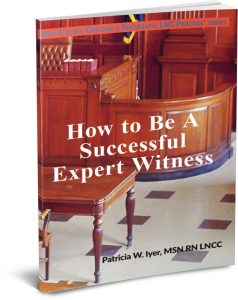Are these hidden traps on your C.V. or resume?
 You have accumulated a lot of great professional expertise and experience. Your client asks for a copy of your C.V. or resume. The difference between these two is primarily in the area of focus and length. A resume is shorter than a C.V.
You have accumulated a lot of great professional expertise and experience. Your client asks for a copy of your C.V. or resume. The difference between these two is primarily in the area of focus and length. A resume is shorter than a C.V.
A CV provides a greater depth of information. A C.V. has no set number of pages. It can be three pages or longer. I have looked at thousands of resumes and C.Vs.
What not to put in your C.V. or resume, particularly if you are an expert witness
1. Don’t include information that you’ve gone to a particular program for legal nurse consulting training if you are an expert witness, because that looks like you’re a hired gun and being an expert witness is your full-time occupation. Would you see a physician put on his or her C.V. that this person is doing expert work or went to a particular program to learn how to do expert work? Of course not. However, if you are presenting yourself as a behind-the-scenes consultant, you might want to stress your legal nurseconsulting education.
2. Don’t list the names of the cases that you’ve worked on or attorneys you have worked for. If you are an expert, this makes it very easy for the opposing counsel to contact those individuals and ask for copies of reports that you’ve written for them. Opposing counsel may indeed want that information, but make them work for it. Don’t give them a path so they can find it.
3. Don’t include a career objective, such as “Find a job in a progressive labor and delivery unit.” That would be appropriate if you were applying for a job, but it’s not appropriate if you are looking for work as an LNC.
4. Don’t include your birth date, marriage date, names and ages of your children, hobbies, political and religious affiliations and extra-curricular activities. It’s never possible to anticipate how somebody is going to react to those. In this era of identity theft, protect your private details. For the same reason, do not list your social security number or nursing license number.
5. Don’t stuff your document with courses you have taken (but not presented) – in other words, everything that you have ever done.
6. Don’t misrepresent your credentials. You’ve probably read stories about people who have been caught in lies. If you lie about your skills or your background, you’ll get caught.
7. Don’t fail to include your contact information – phone number, address, and email. It sounds silly, but I have seen documents without this information and had no way to hand a case to an LNC. Don’t lose out.
 Review your C.V. or resume at least twice a year to keep it current and ready to produce in a moment.
Review your C.V. or resume at least twice a year to keep it current and ready to produce in a moment.
Get more valuable tips in Pat Iyer’s book, How to be a Successful Expert Witness.
